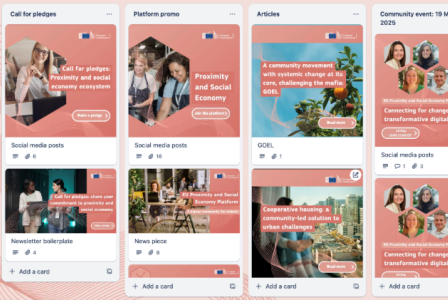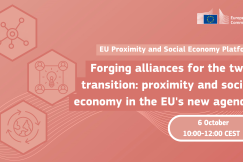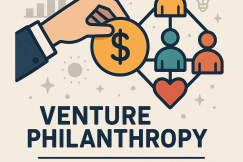Articles
28 October 2025
From Pathway to Practice: a closing note from the EU PSE Platform editorial team
Articles
28 October 2025
Financing the ecosystem
Partnerships
Regenerative Green Transition
+69 more
Login / create an account to be able to react
-
34

Thank you to every Ambassador, practitioner, policymaker, researcher and citizen who contributed to the Proximity and Social Economy (PSE) Transition Pathway and EU PSE Platform. Your pledges, examples and questions have strengthened Europe’s ability to deliver a green and digital transition with people and places at its centre, and shown that the social economy is not a niche, but a strategy for competitiveness and resilience.
Topics
Albania
Armenia
Austria
Belgium
Bosnia and Herzegovina
Bulgaria
Croatia
Cyprus
Czechia
Denmark
Estonia
EU-27
Finland
France
Georgia
Germany
Greece
Hungary
Iceland
Ireland
Italy
Kosovo
Latvia
Liechtenstein
Lithuania
Luxembourg
Malta
Moldova
Montenegro
Netherlands
North Macedonia
Norway
Poland
Portugal
Romania
Serbia
Slovakia
Slovenia
Spain
Sweden
Switzerland
Türkiye
Ukraine
Other
Academic / Research and VET Institutions
Business Support Organisation
Company with 250 or more employees
Cluster Organisations
Consumer Organisations
Cultural and Heritage Organisations
Destination Management & Marketing Organisations
EU Institutions
Financial Institutions and Investors
Industry Associations and Chambers of Commerce
International Organisations
Local Authorities
Media / Journalist Organisations
National authorities
Networks and Federations / Confederations
NGOs / Non-profits
Notified Bodies
Regional Authorities
SMEs (a company with less than 250 employees)
Social Economy Entity
Trade Unions
Other
-
Thematic area
-
-
Financing the ecosystem
-
Partnerships
-
Regenerative Green Transition
-
Skills
-
Transformative Digital Transition
-
Urban and Rural Wellbeing
-
Working conditions and governance
-
-
Interlinkages with other sectors
-
-
Proximity and social economy
-
Agri-food
-
Construction
-
Cultural and creative industries
-
Digital
-
Electronics
-
Energy intensive industries
-
Energy-renewables
-
Health
-
Mobility, transport, automotive
-
Retail
-
Textile
-
Tourism
-
Aerospace and defence
-
-
Action areas and keywords
-
-
15-minute city
-
Access to Finance
-
Access to technology
-
Addressing capacity and skills gap
-
Advancing gender equality and safety at work
-
Blue Economy
-
Boosting digital skills by - and in the social economy
-
Buy social
-
Certification, labelling and self-regulation
-
Circular Economy
-
Clusters (including Cluster of social and ecological innovation)
-
Corporate social responsibility (CSR)
-
Creating financial incentives and supportive regulation for green and circular social economy business models
-
Data Maturity and data driven business models
-
Data sharing, Data management & Code of Conduct
-
Digital Platforms
-
Digital social innovation
-
Economic democracy
-
Education
-
Future workplaces
-
Greening infrastructures and business operations
-
Housing
-
ICP rights & workers involvement
-
Industrial relation and social dialogue
-
Innovation
-
Innovation as enabler for green transition and business development in the social economy
-
Internationalisation
-
Local employment
-
Local Green Deals, green business communities and citizens’ initiatives
-
Local Markets
-
Micro mobility
-
New business models
-
New business models – the platform economy
-
New European Bauhaus
-
Other action area
-
Public and private tech partnerships and support
-
Reinforcing Business to Business collaboration for greener and circular value chains
-
Responsible (Public) Procurement
-
Smart mobility
-
Social Finance
-
Socially oriented territorial regeneration
-
Strategy for Data
-
Supporting Digital Social Innovation & Tech for Good entrepreneurship
-
Sustainable Finance
-
Tech for Good
-
-
Ecosystem focus
-
-
Proximity economy
-
Social economy
-
-
Scope of activity
-
-
International
-
Local/neighbourhood
-
National
-
Regional
-
Share
Two years of co‑creation, hundreds of commitments, and a future built on alliances.
Over the past two years, this community has helped turn the Transition Pathway for the Proximity and Social Economy (PSE) from a policy blueprint into a living practice—through pledges, projects, events, best practice and daily collaboration. As the platform evolves, we, the editorial team formed by Diesis Network, EURICSE, Social Economy Europe (SEE) and EY, wanted to leave one final reflection and a clear invitation for what comes next.
The PSE community is moving, by design
As announced on the platform, PSE has outgrown a single ecosystem space. From 17 October 2025, proximity and social economy becomes a cross‑cutting theme embedded across six active communities, Agri-food, Retail, Tourism, Textiles, Chemicals, and Construction, with all existing PSE content remaining available as an open repository. The Social Economy Gateway continues to serve as the complementary information hub. This is not an end, it’s a handover into mainstream EU industrial collaboration.
What we built together
The platform now features a comprehensive collection of over 260 resources aligned with the 14 action areas of the Transition Pathway, including over 100 best practices, 50 library items, as well as articles, events, and funding opportunities. Editorial guidelines and a planned editorial calendar helped maintain consistency and relevance in published content. Stakeholder contributions also played an important role, particularly through the Ambassador programme, which resulted in 30 contributions to the platform from external experts.
Community engagement was continuously strengthened as the network of stakeholders grew to encompass over 840 organisations and individuals across Europe. The community strategy, incorporating the involvement of a selected group of Ambassadors, encouraged the exchange of ideas through thematic workshops and member contributions. Activities such as three technical sessions and two annual events provided opportunities for knowledge exchange, peer learning, and collaboration, jointly gathering a total of 569 stakeholders.
A capstone moment: forging alliances for the twin transition
Our journey culminated in the online event “Forging alliances for the twin transition: proximity and social economy in the EU’s new agenda”, held on 6 October 2025. Framed around the critical role of alliances in driving sustainable and inclusive growth, it explored the future of social innovation, new cross‑ecosystem partnerships, competitiveness, and practical ways to address pressing societal challenges. The agenda showcased a diverse mix of perspectives and underlined why PSE must operate as a connector across value chains and ecosystems in the Commission’s new agenda.
The consortium behind the curation
Diesis Network. Founded in 1997, Diesis is one of the widest networks specialised in supporting the development of the social economy, social entrepreneurship and social innovation, working through training, project design, advisory and research with 60+ members in 30+ countries. Its ecosystem approach makes it a natural bridge across sectors and territories.
EURICSE – European Research Institute on Cooperative and Social Enterprises. Based in Trento, EURICSE advances research, training and advisory for cooperatives, social enterprises and other nonprofit producers of goods and services. Its mission is to deepen understanding of these organisations and their contribution to economic and social development, work that increasingly informs the twin transition across Europe.
Social Economy Europe (SEE). SEE is the voice of Europe’s 2.8 million social economy enterprises and organisations. Beyond advocacy, SEE serves as the Secretariat of the European Parliament’s Social Economy Intergroup.
EY Belgium. EY Belgium, the organisation leading the EU PSE Platform project, has a dedicated team of consultants who specialise in advising the EU institutions. In particular, EY consultants have extensive expertise in green and digital policies, and experience in implementing large research and stakeholder engagement projects for the EU institutions.
What the Pathway taught us
Policy becomes practice when ecosystems commit. The PSE Transition Pathway, co‑created with stakeholders to support a resilient, green and digital industrial ecosystem, showed that concrete pledges, shared measurement and peer learning move the needle.
Cross‑ecosystem work is the new normal. With PSE now embedded across six industrial communities, collaboration with sector peers is the shortest route to scale.
Digital remains the missing middle. Closing the skills and tooling gap—data sharing, access to technology, and new business models—is urgent for PSE actors to fully contribute to the twin transition.
A shared vision for the next chapter
Make alliances the operating system. Formalise cross‑ecosystem alliances, for example, PSE × Textiles for circular supply chains; PSE × Tourism for regenerative destinations; PSE × Retail for buy‑social procurement, with clear roadmaps, KPIs and open governance.
Double down on digital for social value. Respond to the progress review by launching targeted digital accelerators for social economy actors, covering data maturity, open‑source tools, interoperable standards and privacy‑preserving data sharing, so that digital capability translates into inclusion and productivity.
Invest in skills and organisational capacity. Build modular training and mutual‑support schemes that address the most pledged action areas (skills, innovation enablers, B2B collaboration), prioritising SMEs, WISEs and community cooperatives.
Leverage procurement and place‑based policy. Use responsible public procurement and Local Green Deals to anchor PSE solutions in territories, linking community value with industrial competitiveness and climate objectives.
Keep knowledge open and navigable. Use the Social Economy Gateway as the canonical entry point for funding, case studies and policy updates, and keep the PSE space as a searchable archive.
How to stay connected
The work continues across the Agri-food, Retail, Tourism, Textiles, Chemicals and Construction communities on the Stakeholders Support Platform. Join, share your projects, and keep cross‑posting PSE‑relevant updates. This is how we mainstream proximity and social economy into Europe’s real economy.
Comments (0)
See also
Forging alliances for the twin transition: proximity and social economy in the EU's new agenda: second annual event
- Categories
- Partnerships Regenerative Green Transition Skills +68 more
The evolution of philanthropy: from traditional giving to Venture Philanthropy and Impact-Driven Investment
- Categories
- Partnerships Regenerative Green Transition Skills +68 more
Social Economy European Summit 2025 – Conference: Implementing the SEAP
- Categories
- Partnerships Regenerative Green Transition Skills +67 more



